考博完形
考博英语(完形填空)练习试卷33(题后含答案及解析)
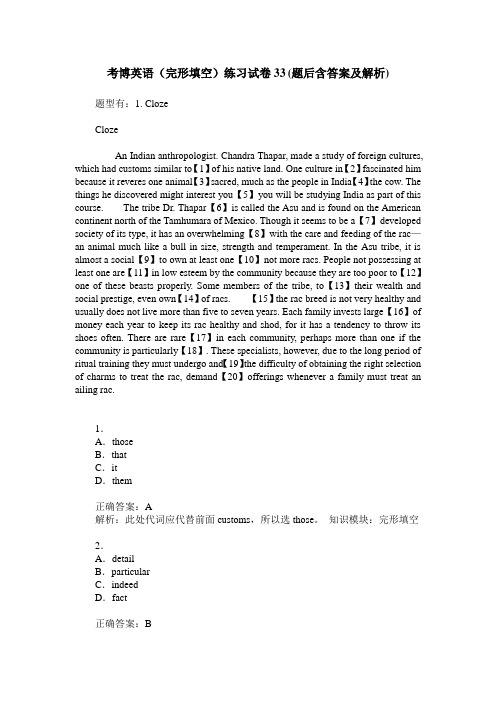
考博英语(完形填空)练习试卷33(题后含答案及解析) 题型有:1. ClozeClozeAn Indian anthropologist. Chandra Thapar, made a study of foreign cultures, which had customs similar to【1】of his native land. One culture in【2】fascinated him because it reveres one animal【3】sacred, much as the people in India【4】the cow. The things he discovered might interest you【5】you will be studying India as part of this course. The tribe Dr. Thapar【6】is called the Asu and is found on the American continent north of the Tamhumara of Mexico. Though it seems to be a【7】developed society of its type, it has an overwhelming【8】with the care and feeding of the rac—an animal much like a bull in size, strength and temperament. In the Asu tribe, it is almost a social【9】to own at least one【10】not more racs. People not possessing at least one are【11】in low esteem by the community because they are too poor to【12】one of these beasts properly. Some members of the tribe, to【13】their wealth and social prestige, even own【14】of racs. 【15】the rac breed is not very healthy and usually does not live more than five to seven years. Each family invests large【16】of money each year to keep its rac healthy and shod, for it has a tendency to throw its shoes often. There are rare【17】in each community, perhaps more than one if the community is particularly【18】. These specialists, however, due to the long period of ritual training they must undergo and【19】the difficulty of obtaining the right selection of charms to treat the rac, demand【20】offerings whenever a family must treat an ailing rac.1.A.thoseB.thatC.itD.them正确答案:A解析:此处代词应代替前面customs,所以选those。
考博英语(完形填空)练习试卷35(题后含答案及解析)

考博英语(完形填空)练习试卷35(题后含答案及解析) 题型有:1. ClozeClozeThe amazing success of humans as a【1】is the result of the evolutionary development of our brains which has led, among other things, to tool-using, tool-making, the【2】to solve problems by logical reasoning, thoughtful cooperation, and language. One of the most striking ways in which chimpanzees biologically【3】humans【4】in structure of their brains. The chimpanzee, with the capacity for【5】reasoning,【6】a type of intelligence more like that of humans than【7】any other mammal living today. The brain of the modern chimpanzee is probably not too dissimilar【8】the brain that so many millions of years ago【9】the behavior of the first ape man. For a long time, the fact that prehistoric people made【10】was considered to be one of the major【11】distinguishing them from other creatures.【12】pointed out earlier, I have watched chimpanzees【13】grass stems in order to use them to probe for termites. It is true that the chimpanzee does not【14】tools to “a regular and set pattern”—but then,【15】people, before their development of stone tools, undoubtedly poked around【16】sticks, and straws, at which stage it seems【17】that they made tools to a set pattern either. It is because of the close【18】in most people’s minds of tools with humans【19】special attention has always been focused upon any animal able to use an object as a tool: but it is important to realize that this ability, on its own, does not necessarily indicate any special intelligence in the creature【20】1.A.speciesB.specieC.specimanD.specimen正确答案:A解析:species是一个单词的单数形式,即“物种”,specimen是“标本”的意思。
考博模拟完形填空30篇(附答案解析)
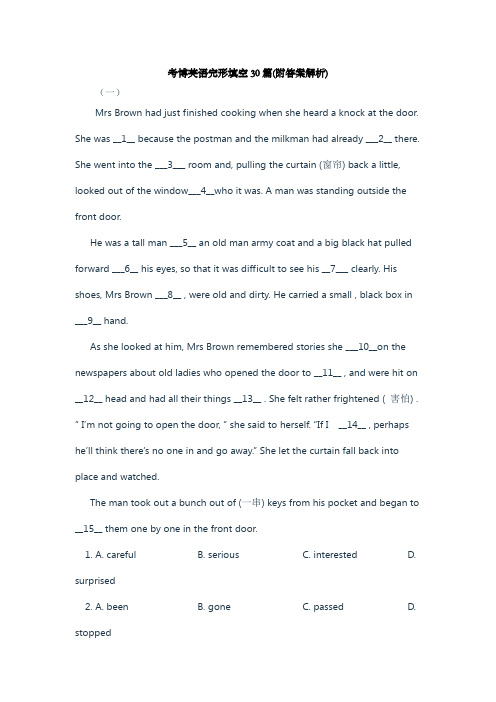
考博英语完形填空30篇(附答案解析)(一)Mrs Brown had just finished cooking when she heard a knock at the door. She was __1__ because the postman and the milkman had already ___2__ there. She went into the ___3___ room and, pulling the curtain (窗帘) back a little, looked out of the window___4__who it was. A man was standing outside the front door.He was a tall man ___5__ an old man army coat and a big black hat pulled forward ___6__ his eyes, so that it was difficult to see his __7___ clearly. His shoes, Mrs Brown ___8__ , were old and dirty. He carried a small , black box in ___9__ hand.As she looked at him, Mrs Brown remembered stories she ___10__on the newspapers about old ladies who opened the door to __11__ , and were hit on __12__ head and had all their things __13__ . She felt rather frightened ( 害怕) . “ I’m not going to open the door, “ she said to herself. “If I __14__ , perhaps he’ll think there’s no one in and go away.” She let the curtain fall back into place and watched.The man took out a bunch out of (一串) keys from his pocket and began to __15__ them one by one in the front door.1. A. careful B. serious C. interested D. surprised2. A. been B. gone C. passed D. stopped3. A. quiet B. front C. dark D. back4. A. to watch B. watching C. to see D. seeing5. A. wore B. wearing C. put on D. putting on6. A. over B. to C. on D. under7. A eyes B. head C. face D. shape8. A. said B. learnt C. recognized D. noticed9. A. the B. one C. / D. a10. A. has read B. was reading C. had read D. is reading11. A. strangers B. visitors C. people D. men12. A. / B. their C. her D. the13. A. gone B. lost C. taken away D. picked up14. A. do B. don’t C. will D. won’t15. A. put B. get C. push D. try( 二)Some people have very good memories, and can 1 learn quite long poems by ___2__ . There are other people who can only __3__ things that they have said again and again.A __4__ memory is a great help in learning a language. __5__ learns his own language by remembering __6__ he hears when he is a small child. Some children __7__in their own country, and they seem to learn two languages___8__ as easily as one. In school it is not so easy to learn __9__ foreign language because students have so __10 __time for it and they are busy with other lessons, too.A man’s mind is rather like a camera, but it takes photos not only __11__ what we see but also what we feel , hear, smell and taste. When we take a real photo__12__a camera, there is much to do when the photo is finished and__13__to show to our friends. In the same way there is much work __14__ before we can keep a picture __15__ in our minds.1. A. easy B. easily C. interesting D. interestingly2. A. heart B. mind C. memory D. attention3. A. notice B. recognize C. remember D. learn4. A. good B. poor C. rich D. bad5. A. Nobody B. Somebody C. Everybody D. Anybody6. A. that B. which C. / D. what7. A .live B. don’t live C. didn’t live D. lived8. A. almost B. mostly C. nearby D. hardly9. A. the B. this C. one D. a10. A. much B. little C. many D. few11. A. about B. at C. with D. of12. A. as B. for C. of D. with13. A. prepared B. ready C. clear D. sure14. A. to be done B. to be doing C. having been done D. being done15. A. up B. on C. ever D. forever(三)Some plays are so successful that they run for years on end. In many ways, this is __1__ for the poor actors who are required to go on repeating the same __2__ night after night. One would __3__ them to know their parts by heart and __4__ have cause to falter(结巴). Yet __5__ is not always the case.A famous actor in a __6__successful play was once cast in the role of an aristocrat __7__ had been imprisoned in Bastille for twenty years. In the last act, a gaoler ( 监狱长,看守) would always come on to the stage with a letter whichhe would hand to the prisoner. __8__ the noble was expected to read the letter at each __9__ , he always insisted that it should be written out in full.One night, the gaoler decided to play a joke __10__ his colleague to find out if , after so many performances, he had managed to learn the __11__ of the letter by heart. The curtain went up on the final act of the play and revealed (使暴露) the aristocrat sitting alone behind bars in his dark cell. Just then, the gaoler __12___ with the precious letter in his hands. He entered the __13__ and presented the letter to the aristocrat. But the copy he gave him had not been written out in __14__ as usual. It was simply a blank sheet of paper. The gaoler looked on eagerly, __15__ to see if his fellow actor had at last learnt his lines. The noble stared at the blank sheet of paper for a few seconds. Then, squinting (眯着眼看) his eyes, he said, “ The light is __16__. Read the letter to me.” And he promptly handed the sheet of paper to the gaoler. __17__ that he could not remember a word of the letter either, the gaoler replied, “ The light is indeed dim , sir. I must get my __18__ .” With this, he hurried off the stage. Much to the aristocrat’s __19__ , the gaoler returned a few moments later with a pair of glasses and the __20__ copy of the letter which he proceeded (继续进行) to read to the prisoner.1. A. fortunate B. unfortunate C. happy D. unhappy2. A. lines B. words C. plays D. roles3. A. want B. ask C. expect D. wish4. A. always B. never C. sometimes D. often5. A. such B. the thing C. one D. this6. A. highly B. high C. poorly D. poor7. A. where B. what C. which D. who8. A. Because B. Even though C. When D. Though9. A. play B. performance C. role D. case10. A. with B. in C. on D. to11. A. pages B. joke C. lines D. contents12. A. appeared B. disappointed C. came out D. came in13. A. room B. cell C. stage D. office14. A. English B. French C. order D. full15. A. worried B. surprised C. anxious D. afraid16. A. bright B. dim C. dark D. out17. A. To see B. To find C. Seeing D. Finding18. A. glasses B. lines C. light D. letters19. A. surprise B. satisfaction C. anger D. amusement20. A. usual B. old C. unusual D. new(四)A person may have an idea about himself that will prevent him from doing good work.He may have the belief that he is not capable (有能力的) of it. A child may think he is __1__ because he doesn’t understand how to make the __2__ of his mental faculties (才能). Older people may be mistaken that they are incapableof learning things new because of their __ 3__.A person who believe that he is incapable will not make a real __4__ because he feels that it would be useless. He won’t go at a job with confidence necessary for __5__ , and he won’t work his hardest way, even though he may think he is doing so. He is __6__ likely to fail, and the failure will __7__ his belief in his competence (才能) .Alfred Alder, a famous doctor, had __8__ like this. When he was a small boy, he had a poor __9__ in maths. His teacher told his parents he had no ability in maths in order that they would not __10__ too much of him. In this way, they two __11__ the idea. He accepted __12__ mistaken thinking of his ability, felt that it was useless to __13__ and was very poor at maths, __14__ as they expected.One day he worked at a problem which __15__ of the other students had been able to solve.Alder __16__ in solving the problem. This gave him confidence (信心). He now __17__ with interest, determination and purpose, and he soon became especially good at __18__. He not only proved that he could learn maths well, but luckily he learned __19__ in his life from his own experience that if a person goes at a job with determination and purpose, he may __20__ himself as well as others by his ability.1. A. clever B. shy C. useless D. stupid2. A. biggest B. most C. highest D. deepest3. A. ability B. age C. brain D. knowledge4. A. decision B. success C. effort D. trouble5. A. work B. study C. improvement D. success6. A. truly B. really C. however D. therefore7. A. lead to B. strengthen C. increase D. add to8. A. an experience B. an example C. a thought D. a story9. A. state B. mind C. start D. ending10. A. blame B. expect C. get D. win11. A. developed B. organized C. discovered D. found12. A. his B. her C. its D. their13. A. manage B. succeed C. try D. act14. A. only B. almost C. just D. then15. A. none B. no C. no one D. nobody16. A. gave B. succeeded C. failed D. believed17. A. lived B. worked C. played D. graduated18. A. lessons B. medicine C. subjects D. maths19. A. early B. deeply C. late D. simply20. A. encourage B. love C. astonish D. disappoint(五)Bedtime stories are one of the delights of early childhood. But according to Dr. Julie Spreadbury from Queensland University, parents should not __1__ up reading to their children__2__they enter primary school. She says listening to, reading and discussing the stories help children's__3__.“My__4__ indicates that once children can read themselves, most parent stop reading__5__them,” Dr. Spreadbury says.“__6__may be at the end of year 1,which is far too__7__.”Dr. Spreadbury says __8_reading not only gives children a good start at school. But brings parents and children closer.“This makes it __9__for them to open up and talk to parents about things that worrying them, or things they are __10__ in their everyday life.”1. A. speed B. keep C. give D. hold2. A. after B. until C. if D. unless3. A. thinking B. comprehension C. relaxation D. development4. A. theory B. research C. story D. decision5. A. about B. from C. to D. through6. A. Some B. Most C. They D. That7. A. difficult B. early C. much D. informal8. A. daily B. healthy C. fast D. bedtime9. A. easier B. funnier C. rarer D. clearer10. A. reading B. promising C. celebrating D. receiving(六)Chinese scientists are again becoming excited about the fact that a large hairy animal may live in central China. Now they hope it won't be too long before they are able to __1__its existence. Their confidence is the __2__of a newdiscovery of the mystery animal in Hubei Province.Ten Chinese __3__, enjoying a holiday in a National Forest Park, were driving down a road. As their bus turned a corner, the men were suddenly__4_by what they saw. Three__5_animals, covered with long black hair, were crossing the road. On seeing the animal, the engineers immediately stopped and __6_them. __7__, when they saw how the animals moved through the forest with great__8__ and strength, they did not dare to follow any further.The men did not take any __9__. However, scientists are__10__ by the discovery, because the engineers were all very educated people and scientists feel they can __11__ What they described.After the discovery, scientists returned to the forest and__12__some hair and measured footprints. About 20 inches appears to be the animal's foot!Chinese scientists have now set up a special group to exchange information and make a__13__of the forest. But in the meantime, some people__14__to believe that this half-man, half-monkey exists. They will not believe that it is__15_until one of the animals have been caught.1. A. prove B. analyze C. protect D. check2. A. basis B. requirement C. result D. preparation3. A. travelers B. engineers C. scientists D. explorers4. A. frightened B. amazed C. upset D. inspired5. A. trained B. projected C. tall D. violent6. A. shot at B. looked at C. fought with D. ran after7. A. However B. Indeed C. Meanwhile D. Anyway8. A. difficulty B. speed C. care D. pleasure9. A. bullets B. tools C. medicinesD.photographs10. A. surprised B. delighted C. disturbed D. supported11. A. rely on B. deal with C. write down D. pass on12. A. cut B. pulled C. collected D. tore13. A. film B. tour C. choice D. study14. A. come B. refuse C. prefer D. have15. A. wrong B. alive C. real D. correct(七)Our airplane was just beside the airport building. It did not look too strong to me, but I decided not to think about such things. We saw the baggage going out __1__it on trolleys and being loaded from __2__ the aircraft. Next, three men and three girls, all in uniform, went over to the plane and __3__ it. Over the loudspeakers we were __4__ the plane was ready to leave and were asked to walk __5__ to it. Everybody moved quickly in order to __6__ the seats they wanted. I was __7___ to get a seat near the tail, but the plane looked __8__ inside than it had from outside. I fastened my seat belt __9___ we took off and tried to __10__ my nervousness.After an hour's flying I __11__ black clouds ahead through my window. An electric sign flashed __12__: “Fasten your seat belts, please, ” and one of the hostesses made a __13__ request over the loudspeakers. She told us we were about to fly into a storm but __14__ cheerfully there was nothing to worry__15___. Suddenly, the plane __16__ all over, dropped about twenty feet and seemed to hang on one __17__. Then it rose twenty feet and there was a great flash of lightning. The three girls did their best to __18__ pills for airsickness and __19__ the passengers. Soon the sky became light again. The pilot had__20__ to get above the storm.1. A.at B.over C.to D.above 2.A.inside B.beside C.behind D.under 3.A.arrived B.entered C.climbed D.flew 4.A.asked B.noticed C.announced D.told 5.A.out B.inside C.in D.by 6.A.fetch B.hold C.keep D.get 7.A.impossible B.possible C.unable D.unsuitable 8.A.prettier B.stronger C.smaller D.heavier 9.A.before B.after C.untilD.when10.A.smooth B.forget C.correct D.drive 11.A.noticed B.looked C.watched D.realized 12.A.on B.up C.out D.in13.A.general B.similar C.common D.sharp 14.A.smiled B.spoke C.addedD.acted15.A.at B.about C.on D.with 16.A.shake B.shaken C.shook D.shocked 17.A.edge B.line C.side D.wing 18.A.give out B.give off C.give up D.give back 19.A.save B.cool C.persuade D.comfort 20.A.succeeded B.flown C.plannedD.managed(八)More and more students want to study in “ hot majors (专攻课程). __1___ a result , many students want to __2___ their interests and study in these __3__ such as foreign languages , international business and law , etc.Fewer and fewer students choose scientific majors, __4__ maths ,physics, and biology, and art majors, __5__ history, Chinese and philosophy. (哲学).__6__ students can study in these “hot” majors, because the number of these “hot” majors __7__limitedIf one __8__ interest in his work or study, __9__ can he do well? I __10__ this from one of my classmates. He is __11__ the countryside. His parents are farmers. Though he __ 12__ biology, he chose “international business.” He__13__ to live a life which is different __14__ of his parents.In the end, he found he __15__ in doing business. He found all the subjectsto be __16__.__17__ this wouldn’t have happened if he had chosen his major according to his own interests.Choosing a major in university __18__ decide one’s whole life. Majors__19__ are not “hot” today may become the “hot” major of tomorrow. Choosing your major according to your own __20__ is the best way to succeed.1. A. Being B. For C. Having D. As2. A. give up B. appear C. give D. master3. A. place B. room C. areas D. space4. A. for example B. such as C. and so on D. as a result5. A. even B. like C. just D. or6. A. Only a few B. Quite a lot C. Perhaps few D. Many7. A. is B. are C. would be D. have been8. A. had to B. had C. has no D. has9. A. why B. and what C.. how D. and how10. A. suggested B. guessed C. searched D. learned11. A. out of B. off C. in D. from12. A. studies B. likes C. learns D. succeeds to study13. A. wants B. doesn’t want to C. enjoys D. doesn’t like14. A. from which B. from that C. for which D. for that15.A. was interested B. was clever C. was not interested D. was not clever16. A.. lovely B. rare C. obvious D. tiresome17. A. so B. Then C. Just then D. Maybe18. A. can B. does not C. probably D. perhaps not to19. A. on which B. in which C. which D./20. A. interests B. experience C. mind D. heart(九)Mary was seven years old. Her parents had recently moved to a new town, and so Mary was going to a __1__ school, which was a few kilometers from the house they lived now. A school bus going around picked up __2__ every morning and brought them back to their __3__ every afternoon , and as both of Mary’s parents __4__ to go to work , she always went on this bus. She had to be at a __5__ twenty metres from her front door by half past eight every day and the __6__ was usually on time.Mary’s parents always __7__ their alarm clock every morning so that none of them would be __8__ . But one morning the alarm __ 9__ to go off, and it wasnot till a quarter past eight that Mary’s mother suddenly woke up, looked__10__ the clock and said, “ What’s ever happened to that clock?” and then__11__ into Mary’s room. Mary was fast asleep, __12__ her mot her woke her up and told her to get ready for school.“I’m __13__ , dear,” she said, “but you’ll have to wash and __14__ very quickly, have an even quicker breakfast and then I’ll __15__ you to school on my way to the office.”“But how can you __16__ the way, Mum?” Mary said “You’ve only been to school once.”“Yes,” her mother answered, “but you’ve done the __17__ several times now in the bus, so you can be by __18__ to get there, can’t you?”“Oh, yes, “ said Mary, “I suppose __19__.” She washed, and dre ssed and had a quick breakfast, and then they set off. Mary told her mother to __20__ each time they came to a place she recognized. In this way she made her mother drive round __21__of the town before they got to her school. When they arrived , her mother __22__ that it was not really very far from her house.“Why ever did you make me go such a long way round, Mary, instead of the most __23__ way?” her mother asked her.“Well, Mum,” answered Mary, “it was because I didn’t know how else to get __24__ . That’s the way our bus __25__ goes to pick up the other children on the way to school.1. A. big B. nice C. different D. primary2. A. pupils B. teachers C. parents D. passengers3. A. streets B. towns C. classrooms D. homes4. A. wanted B. had C. decided D. started5. A. shop B. road C. stop D. corner6. A. bus B. class C. school D. girl7. A. found B. set C. remembered D. fixed8. A. late B. early C. lazy D. asleep9. A. started B. stopped C. failed D. continued10. A. for B. up C. into D. at11. A. broke B. hurried C. walked D. went12. A. but B. and C. so D. then13. A. regretful B. careless C. unhappy D. sorry14. A. go B. get up C. dress D. run15. A. carry B. pick C. drop D. drive16. A. know B. find C. realize D. learn17. A. homework B. job C. trip D. driving18. A. guide B. driver C. partner D. teacher19. A. this B. that C. not D. so20. A. speed B. turn C. think D. stop21. A. part B. some C. outside D. most22. A. saw B. thought C. said D. heard23. A. easiest B. straight C. correct D. direct24. A. here B. there C. home D. back25. A. sometimes B. always C. never D. seldom (十)Many people who work in London prefer to live outside it, and to go into their offices, factories or schools every day by train, car or bus, even though this means they have to get up __1__ in the morning and reach __2__ later in the evening.One benefit of living outside London is __3__ houses are __4__ . Even a small flat in London __5__ a garden costs quite a lot __6__ . With the same money, one can get a little house in the country with a garden of __7__own.Then, in the country one can be __8__ from the noise and hurry of the town. Although one has to __9__ earlier and spend more time in trains or buses, one can sleep __10__ at night , and , during weekends and __11__ summer evenings, one can enjoy the __12__ , clean air of the country . If one __13__ gardens, one can spend one’s __14__ time digging, planting, watering and doing a hundred and one other jobs which __15__ in the garden. Then , when the flowers and vegetables __16__ , one has the reward of a person __17__ has the secrets of__18__.Some people , however, take__19__ in country things; for them ,, __20__ lies in the town, with its cinema and theatres, because of shops and busy streets, dance—halls and restaurants. Such people would __21__ that their life was not worth __22__ if they had to live __23__ outside London. A walk in one of the parks and a visit __24__ the sea every summer is all the country __25__.1. A. at 8 o’clock B. early C. earlier D. earliest2. A. home B. family C. flat D. house3. A. because B. that C. the D. all4. A .cleaner B. nicer C. bigger D. cheaper5. A. with B. without C. near D. opposite6. A. money B. to lend C. to borrow D. to rent7. A. it’s B. its C. one’s D. their8. A. free B. far C. out D. absent9. A. return home B. get up C. go to bed D. go to sleep10. A. little B. less C. longer D. better11. A. on B. for C. at D. by12. A. cold B. warm C. fresh D. pleasant13. A. pleases B. likes C. wants D. interests14. A. day B. rest C. spare D. whole15. A. need B. needed C. are needing D.are needed16. A. come on B. come to C. come up D. come over17. A. who B. whom C. whose D. which18. A. mankind B. society C. science D. nature19. A. not interest B. an interest C. much interest D. great interest20. A. health B. happiness C. wealth D. future21. A. know B. feel C. understand D. hope22. A. to live B. to spend C. living ` D. spending23. A. it B. life C. this D. that24. A. for B. to C. of D. at25. A. hope B. wish C. ask D. want(十一)Soon it would be the holidays, but before that, there were year exams. All the 1_____ had been working hard for some time, reviewing their lessons for the exams. If they didn’t 2_____, they would have to retake them in September. There were usually a few who 3_____, but Jane didn’t want to be one of them. She had worked hard all year, 4_____ just before the exams she was working so hard that her sister Barbara was 5_____ about her. She went to bed too 6_____.The night before the first exam, Barbara 7____ that she have an early night and take a 8____ pill(药丸). She promised to wake 9_____up in the morning.As she was falling asleep, Jane was afraid that she might oversleep. Her 10_____ kept jumping from subject to subject. At last, with the help of 11____, she went to sleep. In no time at all, she was sitting in the examination hall, looking at the examination 12_____, but she couldn’t answer any of the questions. 13_____ around her was writing pages and gages. 14_____ she thought hard, she couldn’t find anything to wr ite 15_____. She kept looking at her 16_____. Time was running out. There was only an hour to go. She started one question, wrote two sentences, 17_____ and tried another one. With only half an hour left she wrote another two sentences. By this time she was so worried that she started 18____. Her whole body shook. It shook so much that she 19____ up. She was still in bed and it had all been a 20_____ dream. A minute later, Barbara called her name.1. A. teachers B. students C. classmates D. schools2. A. prepare B. miss C. join D. pass3. A. succeeded B. failed C. ended D. called4. A. but B. so C. and D. because5. A. excited B. frightened C. worried D. pleased6. A. early B. late C. heavily D. eagerly7. A. insisted B. hoped C. ordered D. wished8. A. sleeping B. resting C. exciting D. breathing9. A. him B. her C. them D. herself10.A. hand B. eye C. mind D. body11.A. her sister B. her parents C. the lessons D. the medicine12.A. result B. marks C. desk D. paper13.A. The teacher B. The students C. No one D. Everyone14.A.If B. Though C. So D. How15.A. with B. about C. on D. to16.A. watch B. textbook C. sister D. subject17.A. gave up B. put off C. look around D. think over18.A. examining B. leaving C. copying D. crying19.A. raised B. woke C. stood D. cheered20.A. nice B. wonderful C. terrible D. special答案简析:1、选B。
考博英语(完形填空)练习试卷39(题后含答案及解析)

考博英语(完形填空)练习试卷39(题后含答案及解析) 题型有:1. ClozeClozeBig cities today are confronted with very serious problems. Transport is a 【1】difficulty: some planners believe in【2】transport system; others believe in making it possible for citizens to move 【3】in private cars. There are several ways of 【4】a public transport system. Sometimes it is built under the ground; sometimes it is on the【5】, and sometimes it is even above ground level,【6】in parts of New York and Tokyo for example. In most cases, of course, it is a【7】of some or all of these elements. The【8】of the city centers has also been a problem in the last 30 years. The hearts of many cities have become poorer and poorer,【9】more and more crime and violence,【10】the people who can afford to have moved out to the【11】. This is the opposite of the situation 100 years ago,【12】wealthy people lived in the center, and the poor lived 【13】the outskirts of the city. Ecological problems also【14】, as factories and cars pollute the air, trees are cut down to make【15】for urban clearways, and crowded conditions cause garbage to【16】in the streets. In order to solve these problems, some planners believe we should limit the size of our cities, perhaps by restricting population, or perhaps by offering【17】jobs in the provinces. Others believe that cities cannot be limited in size and that the problems must be solved in a 【18】of ways—by creating green areas, building【19】houses for everybody, stopping factory pollution,【20】motor transport, and so on.1.A.minorB.majorC.littleD.small正确答案:B解析:各项的意思是:minor较小的,次要的;major主要的,重要的;little 很少的,矮小的;small小的,少的。
考博英语(完形填空)练习试卷25(题后含答案及解析)

考博英语(完形填空)练习试卷25(题后含答案及解析) 题型有:1. ClozeClozeAmerican women experience a great【1】of lifestyles. A “typical” American woman may be single. She may also be divorced or married. She may be a housewife, a doctor【2】a factory worker. It is very difficult to【3】about American women.【4】, the one thing which【5】American women from the women in other countries is their attitude【6】themselves and their role in American life. 【7】, American women have always been very independent. The first colonists to come to New England were often young couples who had left behind their【8】family (i.e. , their parents, sisters, cousins, etc. ). The women were【9】in a new,【10】country with their husbands. This had two important effects.【11】, this as yet uncivilized environment demanded that every person【12】in developing it and in survival. Women worked【13】their husbands and children to establish themselves in this new【14】Second, because they were in a new land without the【15】influence of older members of society, women felt free to step into nontraditional【16】In addition, there were no rules in the Protestant religion which demanded that women stay【17】any definite role. This strong role of women was【18】in later years as Americans moved west, again, leaving family behind and encountering a(n)【19】environment.【20】later, in the East, as new immigrants arrived, the women often found jobs more easily than men.1.A.quantityB.varietyC.kindD.show正确答案:B解析:从下文来看,讲的是美国妇女各种各样的生活方式,所以用variety。
考博英语(完形填空)模拟试卷13(题后含答案及解析)
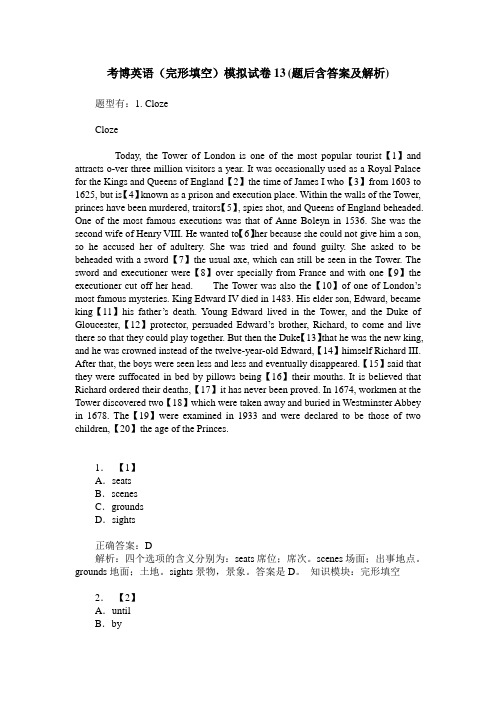
考博英语(完形填空)模拟试卷13(题后含答案及解析) 题型有:1. ClozeClozeToday, the Tower of London is one of the most popular tourist【1】and attracts o-ver three million visitors a year. It was occasionally used as a Royal Palace for the Kings and Queens of England【2】the time of James I who【3】from 1603 to 1625, but is【4】known as a prison and execution place. Within the walls of the Tower, princes have been murdered, traitors【5】, spies shot, and Queens of England beheaded. One of the most famous executions was that of Anne Boleyn in 1536. She was the second wife of Henry VIII. He wanted to【6】her because she could not give him a son, so he accused her of adultery. She was tried and found guilty. She asked to be beheaded with a sword【7】the usual axe, which can still be seen in the Tower. The sword and executioner were【8】over specially from France and with one【9】the executioner cut off her head. The Tower was also the【10】of one of London’s most famous mysteries. King Edward IV died in 1483. His elder son, Edward, became king【11】his father’s death. Young Edward lived in the Tower, and the Duke of Gloucester,【12】protector, persuaded Edward’s brother, Richard, to come and live there so that they could play together. But then the Duke【13】that he was the new king, and he was crowned instead of the twelve-year-old Edward,【14】himself Richard III. After that, the boys were seen less and less and eventually disappeared.【15】said that they were suffocated in bed by pillows being【16】their mouths. It is believed that Richard ordered their deaths,【17】it has never been proved. In 1674, workmen at the Tower discovered two【18】which were taken away and buried in Westminster Abbey in 1678. The【19】were examined in 1933 and were declared to be those of two children,【20】the age of the Princes.1.【1】A.seatsB.scenesC.groundsD.sights正确答案:D解析:四个选项的含义分别为:seats席位;席次。
考博英语(完形填空)练习试卷6(题后含答案及解析)

考博英语(完形填空)练习试卷6(题后含答案及解析) 题型有:1. ClozeClozeThe normal human daily cycle of activity is of some 7~8 hours’ sleep【1】with some 16 —17 hours’ wakefulness and that the sleep normally coincides【2】the hours of darkness. Our present【3】is with how easily and to what extent this【4】can be modified. The question is no mere academic one. The ease with【5】people can change from working in the day to working at night is a【6】of growing importance in industry where automation【7】round-the-clock working of machines. It normally【8】from five days to one week for a person to adapt to a【9】routine of sleep and wakefulness, sleeping【10】the day and working at night.【11】it is often the case in industry that shifts are changed every week. This【12】that no sooner has he got used to one routine【13】he has to change to another,【14】much of his time is spent neither working nor sleeping very【15】One answer would seem to be【16】periods on each shift, a month, or even three months.【17】, recent research has shown that people on such systems will revert to go back to their【18】habits of sleep and wakefulness during the week-end and that this is quite enough to destroy any 【19】to night work built up during the week. The only real solution appears to be to hand over the night shift to those permanent night workers whose【20】may persist through all week-ends and holidays.1.A.allegationB.alternationC.allocationD.alternative正确答案:B解析:allegation意为“主张,断言”;allocation意为“分配,安置”,均与文章的意思不符。
考博英语(完形填空)练习试卷41(题后含答案及解析)

考博英语(完形填空)练习试卷41(题后含答案及解析) 题型有:1. ClozeClozeThe way that people spend their money, and the objects on which they spend it, are the last areas where free choice and individuality can be expressed. The choice reflects personal taste, the way people see themselves and the fantasies they 【1】about their lives, the restrictions on money available【2】them, the presence of others in the family with a【3】on that money, and the influence of current convention,【4】, surroundings and locality. Shopping is an important human activity. Yet shoppers are【5】with a confusing situation and a(n)【6】changing one. The confusion arises from the claims【7】advertising, from inadequate information about new products, new materials, new places to shop—a confusion enhanced by rising prices and a(n)【8】choice of goods than ever before. The search【9】the right purchase is based on ignorance of【10】own needs and ignorance of the product’s【11】for those needs. When choosing any particular item, there are several lines of communication which might provide some guidance.【12】none of these is entirely satisfactory. For example, you can ask a shop assistant initially.【13】you find one, she may quite【14】not know the answers. She may be a schoolgirl with a Saturday job, or a housewife 【15】part-time.1.A.imagineB.possessC.haveD.own正确答案:B解析:possess意为“占有,拥有(财产、知识、能力等),(感觉、思想等)支配”,与fantasies搭配,意为“抱有(拥有)幻想”。
考博英语(完形填空)历年真题试卷汇编11(题后含答案及解析)
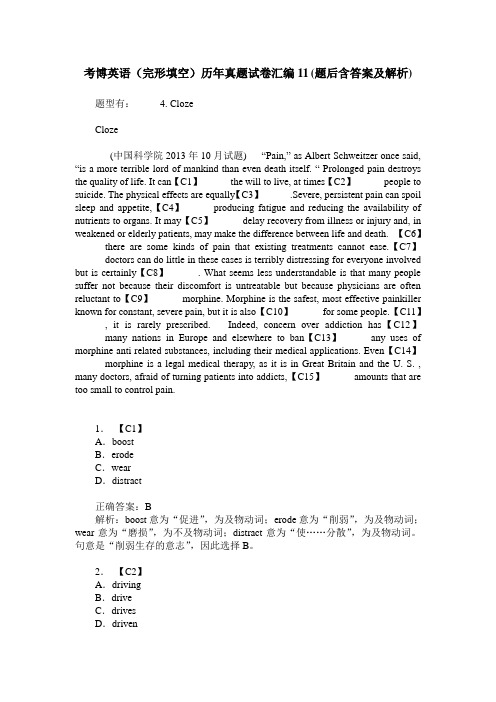
考博英语(完形填空)历年真题试卷汇编11(题后含答案及解析) 题型有: 4. ClozeCloze(中国科学院2013年10月试题) “Pain,” as Albert Schweitzer once said, “is a more terrible lord of mankind than even death itself. “ Prolonged pain destroys the quality of life. It can【C1】______the will to live, at times【C2】______people to suicide. The physical effects are equally【C3】______.Severe, persistent pain can spoil sleep and appetite,【C4】______producing fatigue and reducing the availability of nutrients to organs. It may【C5】______delay recovery from illness or injury and, in weakened or elderly patients, may make the difference between life and death. 【C6】______there are some kinds of pain that existing treatments cannot ease.【C7】______doctors can do little in these cases is terribly distressing for everyone involved but is certainly【C8】______. What seems less understandable is that many people suffer not because their discomfort is untreatable but because physicians are often reluctant to【C9】______morphine. Morphine is the safest, most effective painkiller known for constant, severe pain, but it is also【C10】______for some people.【C11】______, it is rarely prescribed. Indeed, concern over addiction has【C12】______many nations in Europe and elsewhere to ban【C13】______any uses of morphine anti related substances, including their medical applications. Even【C14】______morphine is a legal medical therapy, as it is in Great Britain and the U. S. , many doctors, afraid of turning patients into addicts,【C15】______amounts that are too small to control pain.1.【C1】A.boostB.erodeC.wearD.distract正确答案:B解析:boost意为“促进”,为及物动词;erode意为“削弱”,为及物动词;wear意为“磨损”,为不及物动词;distract意为“使……分散”,为及物动词。
考博英语(完形填空)练习试卷15(题后含答案及解析)
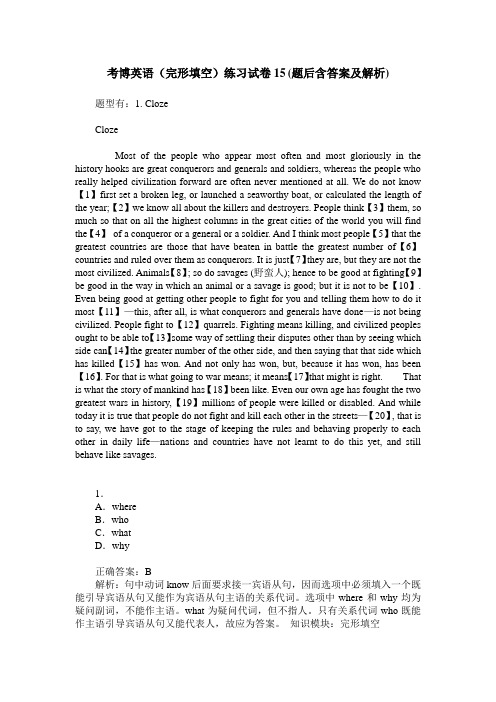
考博英语(完形填空)练习试卷15(题后含答案及解析) 题型有:1. ClozeClozeMost of the people who appear most often and most gloriously in the history hooks are great conquerors and generals and soldiers, whereas the people who really helped civilization forward are often never mentioned at all. We do not know 【1】first set a broken leg, or launched a seaworthy boat, or calculated the length of the year;【2】we know all about the killers and destroyers. People think【3】them, so much so that on all the highest columns in the great cities of the world you will find the【4】of a conqueror or a general or a soldier. And I think most people【5】that the greatest countries are those that have beaten in battle the greatest number of【6】countries and ruled over them as conquerors. It is just【7】they are, but they are not the most civilized. Animals【8】; so do savages (野蛮人); hence to be good at fighting【9】be good in the way in which an animal or a savage is good; but it is not to be【10】. Even being good at getting other people to fight for you and telling them how to do it most【11】—this, after all, is what conquerors and generals have done—is not being civilized. People fight to【12】quarrels. Fighting means killing, and civilized peoples ought to be able to【13】some way of settling their disputes other than by seeing which side can【14】the greater number of the other side, and then saying that that side which has killed【15】has won. And not only has won, but, because it has won, has been 【16】. For that is what going to war means; it means【17】that might is right. That is what the story of mankind has【18】been like. Even our own age has fought the two greatest wars in history,【19】millions of people were killed or disabled. And while today it is true that people do not fight and kill each other in the streets—【20】, that is to say, we have got to the stage of keeping the rules and behaving properly to each other in daily life—nations and countries have not learnt to do this yet, and still behave like savages.1.A.whereB.whoC.whatD.why正确答案:B解析:句中动词know后面要求接一宾语从句,因而选项中必须填入一个既能引导宾语从句又能作为宾语从句主语的关系代词。
考博英语完型考查重点及复习策略-育明考博
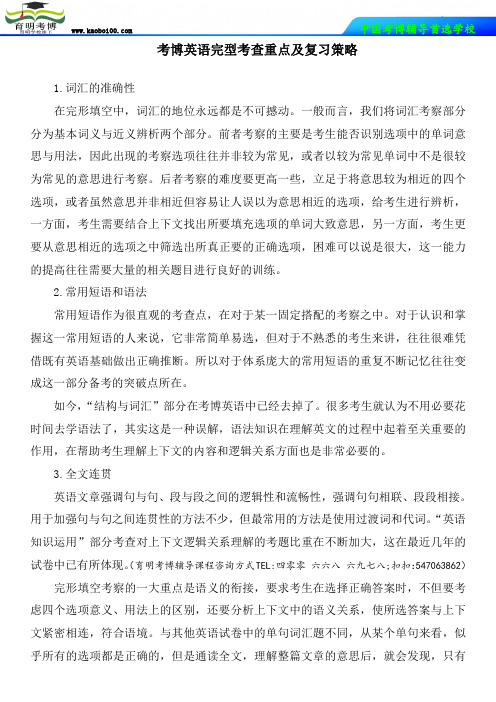
考博英语完型考查重点及复习策略1.词汇的准确性在完形填空中,词汇的地位永远都是不可撼动。
一般而言,我们将词汇考察部分分为基本词义与近义辨析两个部分。
前者考察的主要是考生能否识别选项中的单词意思与用法,因此出现的考察选项往往并非较为常见,或者以较为常见单词中不是很较为常见的意思进行考察。
后者考察的难度要更高一些,立足于将意思较为相近的四个选项,或者虽然意思并非相近但容易让人误以为意思相近的选项,给考生进行辨析,一方面,考生需要结合上下文找出所要填充选项的单词大致意思,另一方面,考生更要从意思相近的选项之中筛选出所真正要的正确选项,困难可以说是很大,这一能力的提高往往需要大量的相关题目进行良好的训练。
2.常用短语和语法常用短语作为很直观的考查点,在对于某一固定搭配的考察之中。
对于认识和掌握这一常用短语的人来说,它非常简单易选,但对于不熟悉的考生来讲,往往很难凭借既有英语基础做出正确推断。
所以对于体系庞大的常用短语的重复不断记忆往往变成这一部分备考的突破点所在。
如今,“结构与词汇”部分在考博英语中已经去掉了。
很多考生就认为不用必要花时间去学语法了,其实这是一种误解,语法知识在理解英文的过程中起着至关重要的作用,在帮助考生理解上下文的内容和逻辑关系方面也是非常必要的。
3.全文连贯英语文章强调句与句、段与段之间的逻辑性和流畅性,强调句句相联、段段相接。
用于加强句与句之间连贯性的方法不少,但最常用的方法是使用过渡词和代词。
“英语知识运用”部分考查对上下文逻辑关系理解的考题比重在不断加大,这在最近几年的试卷中已有所体现。
(育明考博辅导课程咨询方式TEL:四零零 六六八 六九七八;扣扣:547063862)完形填空考察的一大重点是语义的衔接,要求考生在选择正确答案时,不但要考虑四个选项意义、用法上的区别,还要分析上下文中的语义关系,使所选答案与上下文紧密相连,符合语境。
与其他英语试卷中的单句词汇题不同,从某个单句来看,似乎所有的选项都是正确的,但是通读全文,理解整篇文章的意思后,就会发现,只有一个选择是最佳的选项。
考博英语(完形填空)练习试卷3(题后含答案及解析)
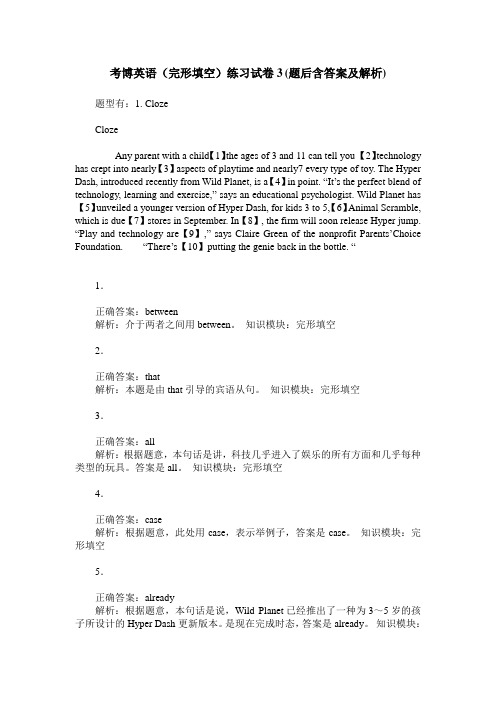
考博英语(完形填空)练习试卷3(题后含答案及解析) 题型有:1. ClozeClozeAny parent with a child【1】the ages of 3 and 11 can tell you 【2】technology has crept into nearly【3】aspects of playtime and nearly7 every type of toy. The Hyper Dash, introduced recently from Wild Planet, is a【4】in point. “It’s the perfect blend of technology, learning and exercise,” says an educational psychologist. Wild Planet has 【5】unveiled a younger version of Hyper Dash, for kids 3 to 5,【6】Animal Scramble, which is due【7】stores in September. In【8】, the firm will soon release Hyper jump. “Play and technology are【9】,” says Claire Green of the nonprofit Parents’Choice Foundation. “There’s【10】putting the genie back in the bottle. “1.正确答案:between解析:介于两者之间用between。
知识模块:完形填空2.正确答案:that解析:本题是由that引导的宾语从句。
知识模块:完形填空3.正确答案:all解析:根据题意,本句话是讲,科技几乎进入了娱乐的所有方面和几乎每种类型的玩具。
考博英语(完形填空)练习试卷27(题后含答案及解析)

考博英语(完形填空)练习试卷27(题后含答案及解析) 题型有:1. ClozeClozeCulture shock might be called an【1】disease of people who have been suddenly【2】abroad. Like most ailments, it has its own【3】and cure. Culture shock is【4】by the anxiety that results from losing all our familiar signs and symbols of social intercourse. Those signs or cues include the thousand and one【5】in which we orient ourselves【6】the situation of daily life: when to shake hands and what to say when we meet people, when and how to give tips, how to【7】purchases, when to accept and when to refuse invitations, when to take statement seriously and when【8】These cues, which may be words, gestures, facial expressions, customs, or norms, are 【9】by all of us【10】the course of growing up and are【11】much a part of our culture as the language we speak or the beliefs we accept. All of us depend【12】our peace of mind and our efficiency on hundreds of these cues, most of which we do not carry on the level of conscious awareness. Now when an individual【13】a strange culture, all or most of these familiar cues are removed. He or she is like a【14】,【15】how broad-minded or full of goodwill you may be, a series of props have been knocked 【16】under you, followed by a feeling of frustration and anxiety. People react to the frustration in【17】the same way. First they【18】the environment which causes the discomfort. “The ways of the host country are bad because they make us feel bad. “ When foreigners in a strange land get together to【19】about the host country and its people, you can be sure they are 【20】from culture shock.1.A.professionalB.skillfulC.occupationalD.vocational正确答案:C解析:occupational disease是固定搭配,意为“职业病”。
考博英语(完形填空)练习试卷30(题后含答案及解析)
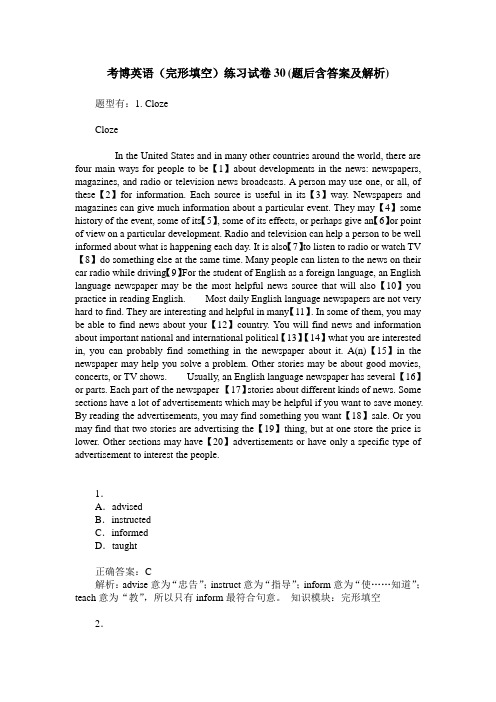
考博英语(完形填空)练习试卷30(题后含答案及解析) 题型有:1. ClozeClozeIn the United States and in many other countries around the world, there are four main ways for people to be【1】about developments in the news: newspapers, magazines, and radio or television news broadcasts. A person may use one, or all, of these【2】for information. Each source is useful in its【3】way. Newspapers and magazines can give much information about a particular event. They may【4】some history of the event, some of its【5】, some of its effects, or perhaps give an【6】or point of view on a particular development. Radio and television can help a person to be well informed about what is happening each day. It is also【7】to listen to radio or watch TV 【8】do something else at the same time. Many people can listen to the news on their car radio while driving【9】For the student of English as a foreign language, an English language newspaper may be the most helpful news source that will also【10】you practice in reading English. Most daily English language newspapers are not very hard to find. They are interesting and helpful in many【11】. In some of them, you may be able to find news about your【12】country. You will find news and information about important national and international political【13】【14】what you are interested in, you can probably find something in the newspaper about it. A(n)【15】in the newspaper may help you solve a problem. Other stories may be about good movies, concerts, or TV shows. Usually, an English language newspaper has several【16】or parts. Each part of the newspaper 【17】stories about different kinds of news. Some sections have a lot of advertisements which may be helpful if you want to save money. By reading the advertisements, you may find something you want【18】sale. Or you may find that two stories are advertising the【19】thing, but at one store the price is lower. Other sections may have【20】advertisements or have only a specific type of advertisement to interest the people.1.A.advisedB.instructedC.informedD.taught正确答案:C解析:advise意为“忠告”;instruct意为“指导”;inform意为“使……知道”;teach意为“教”,所以只有inform最符合句意。
考博英语(完形填空)练习试卷56(题后含答案及解析)
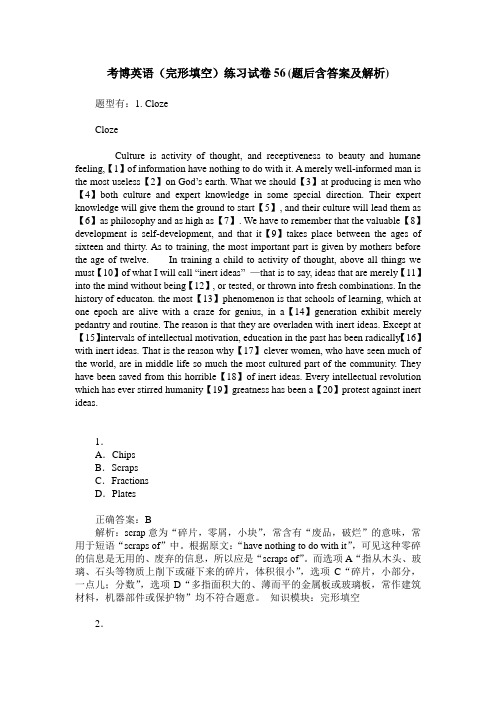
考博英语(完形填空)练习试卷56(题后含答案及解析) 题型有:1. ClozeClozeCulture is activity of thought, and receptiveness to beauty and humane feeling,【1】of information have nothing to do with it. A merely well-informed man is the most useless【2】on God’s earth. What we should【3】at producing is men who 【4】both culture and expert knowledge in some special direction. Their expert knowledge will give them the ground to start【5】, and their culture will lead them as 【6】as philosophy and as high as【7】. We have to remember that the valuable【8】development is self-development, and that it【9】takes place between the ages of sixteen and thirty. As to training, the most important part is given by mothers before the age of twelve. In training a child to activity of thought, above all things we must【10】of what I will call “inert ideas”—that is to say, ideas that are merely【11】into the mind without being【12】, or tested, or thrown into fresh combinations. In the history of educaton. the most【13】phenomenon is that schools of learning, which at one epoch are alive with a craze for genius, in a【14】generation exhibit merely pedantry and routine. The reason is that they are overladen with inert ideas. Except at 【15】intervals of intellectual motivation, education in the past has been radically【16】with inert ideas. That is the reason why【17】clever women, who have seen much of the world, are in middle life so much the most cultured part of the community. They have been saved from this horrible【18】of inert ideas. Every intellectual revolution which has ever stirred humanity【19】greatness has been a【20】protest against inert ideas.1.A.ChipsB.ScrapsC.FractionsD.Plates正确答案:B解析:scrap意为“碎片,零屑,小块”,常含有“废品,破烂”的意味,常用于短语“scraps of”中。
考博完形

考博英语--考博完形考博英语完形填空常考词组及固定搭配-Aa host of 大量a test for检测目的a test on对……进行测试a test with检测手段achieve equilibrium取得平衡achieve one’s purpose达到目的achieve victory获得胜利act on 遵照┄行动,作用于;act on对…有影响add up to 总计,合计add… to 把…加到….adhere to 坚持,奉行;after all 毕竟;agree to同意along with 和┄一道,和┄一起;alternate (with)交替;amount to 合计,共计;an equal to与……相当的人/物,(地位)相同的人and yet然而anything but 一点也不;anything like像……那样的东西anywhere near接近于apart form除……之外尚有apply to 向……申请,适用于appreciation of对……的欣赏/赞赏argue against 反对as a result of作为……的结果,由于as a whole 作为一个整体,整个看来as far as …/are concerned就……而言as for至于,就…方面说as though好像,仿佛as to 至于,关于;as well也,一样as yet迄今,到目前为止aside from 除┄之外;associate … with…由……联想到……,把……联系起来association with与……的交往at a disadvantage处于不利地位at a loss不知所措at a time每次,一次at any moment即使,随时。
at first 首先,开始的时候;at large未被捕获的,大多数;at length 最终,详细地;at most最多at no time从不,决不at one time曾经,从前曾at the cost of以……为代价at the least 至少;at times有时,间或;at…speed以……的速度attend on 照顾,侍候;attribute … to 把……归于考博英语完形填空常考词组及固定搭配-Bback up 后退,支持;be able to能够,胜任be about to正打算be accustomed to习惯于be associated with 与……有关,与……有关系be aware of 意识到;be capable of 有能力干;be caught 遇到,陷入be committed to被交给┄,答应承担┄义务;be confined to 限制在,局限于;be confined/be restricted受……限制be dedicated to 奉献,献给;be devoted to 被用于,贡献给be directed to指向,针对be drawn to 被┄所吸引;be due to由于,因此be exposed to 暴露在┄下,处在┄的作用之下; be fond of 喜爱be habitual to(him) 对(他来说)习以为常be in order合适,恰当。
考博英语(完形填空)练习试卷9(题后含答案及解析)
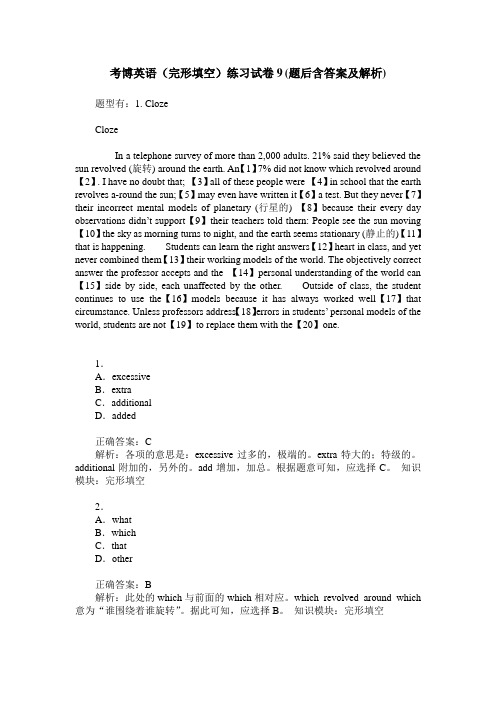
考博英语(完形填空)练习试卷9(题后含答案及解析) 题型有:1. ClozeClozeIn a telephone survey of more than 2,000 adults. 21% said they believed the sun revolved (旋转) around the earth. An【1】7% did not know which revolved around 【2】. I have no doubt that; 【3】all of these people were 【4】in school that the earth revolves a-round the sun;【5】may even have written it【6】a test. But they never【7】their incorrect mental models of planetary (行星的) 【8】because their every day observations didn’t support【9】their teachers told thern: People see the sun moving 【10】the sky as morning turns to night, and the earth seems stationary (静止的)【11】that is happening. Students can learn the right answers【12】heart in class, and yet never combined them【13】their working models of the world. The objectively correct answer the professor accepts and the 【14】personal understanding of the world can 【15】side by side, each unaffected by the other. Outside of class, the student continues to use the【16】models because it has always worked well【17】that circumstance. Unless professors address【18】errors in students’ personal models of the world, students are not【19】to replace them with the【20】one.1.A.excessiveB.extraC.additionalD.added正确答案:C解析:各项的意思是:excessive过多的,极端的。
考博完形

1.This trend begun during the Second World War, when several governments came to the conclusion that the specific demands that a government wants to make of its scientific establishment cannot generally be foreseen in detail.2. Sleep deprivation has a similar impact on the body to the aging process and may increase the severity of age-related chronic disorders such as heart disease and diabetes, researchers have found.3. Many People consider impossible what is really possible.4. They call into question all of our cultural assumptions that gay men are feminine.5. Widely acknowledged as a great and important playwright, Eugene O’Neill brought to the United States stage what was probably its first really serious drama.6. On the other hand, he did not accept as well founded the charge made by some of his critics that while he was a good observer, he had no power of reasoning.7. The mineral elements from the soil that are usable by the plant must be dissolved in the soil solution before they can be taken into the root.8. It can be predicted, however, that from time to time questions will arise which will require specific scientific answer.9. As a linguist, he acknowledges that all varieties of human language, including non-standard ones like Black English, can be powerfully expressive___ there exists no language or dialect in the world that cannot convey complex ideas.10。
- 1、下载文档前请自行甄别文档内容的完整性,平台不提供额外的编辑、内容补充、找答案等附加服务。
- 2、"仅部分预览"的文档,不可在线预览部分如存在完整性等问题,可反馈申请退款(可完整预览的文档不适用该条件!)。
- 3、如文档侵犯您的权益,请联系客服反馈,我们会尽快为您处理(人工客服工作时间:9:00-18:30)。
考博英语--考博完形考博英语完形填空常考词组及固定搭配-Aa host of 大量a test for检测目的a test on对……进行测试a test with检测手段achieve equilibrium取得平衡achieve one’s purpose达到目的achieve victory获得胜利act on 遵照┄行动,作用于;act on对…有影响add up to 总计,合计add…to 把…加到….adhere to 坚持,奉行;after all 毕竟;agree to同意along with 和┄一道,和┄一起;alternate (with)交替;amount to 合计,共计;an equal to与……相当的人/物,(地位)相同的人and yet然而anything but 一点也不;anything like像……那样的东西anywhere near接近于apart form除……之外尚有apply to 向……申请,适用于appreciation of对……的欣赏/赞赏argue against 反对as a result of作为……的结果,由于as a whole 作为一个整体,整个看来as far as …/are concerned就……而言as for至于,就…方面说as though好像,仿佛as to 至于,关于;as well也,一样as yet迄今,到目前为止aside from 除┄之外;associate …with…由……联想到……,把……联系起来association with与……的交往at a disadvantage处于不利地位at a loss不知所措at a time每次,一次at any moment即使,随时。
at first 首先,开始的时候;at large未被捕获的,大多数;at length 最终,详细地;at most最多at no time从不,决不at one time曾经,从前曾at the cost of以……为代价at the least 至少;at times有时,间或;at…speed以……的速度attend on 照顾,侍候;attribute …to 把……归于考博英语完形填空常考词组及固定搭配-Bback up 后退,支持;be able to能够,胜任be about to正打算be accustomed to习惯于be associated with 与……有关,与……有关系be aware of 意识到;be capable of 有能力干;be caught 遇到,陷入be committed to被交给┄,答应承担┄义务;be confined to 限制在,局限于;be confined/be restricted受……限制be dedicated to 奉献,献给;be devoted to 被用于,贡献给be directed to指向,针对be drawn to 被┄所吸引;be due to由于,因此be exposed to 暴露在┄下,处在┄的作用之下;be fond of 喜爱be habitual to(him) 对(他来说)习以为常be in order合适,恰当。
be involved in 参与,参加;be involved with 与……有关连,be left to 由┄来决定,由┄来想办法;be limited to限制在┄,限定在┄;be linked to/with something 与……连接be proud of 为~而骄傲。
be referred to被提及,被提交be sick of 厌恶┄,讨厌┄;be subject to 经受,遭受;be suitable for适合于be sure of 对┄的肯定;be thrown in 额外赠送be tied by/with被……捆绑be tied to 束缚于,捆绑于be tired of 厌倦┄,厌烦┄;behind time 晚点believe(…to be) 相信……是beyond question毋庸置疑break away脱离,逃跑break down 损坏,分解,瓦解break into闯入break in强行进行,打断break off断绝,结束break out突发,爆发break through突破break up终止,结束,打碎bring about 产生;bring forward 提出。
bring out 使出现;公布;出版;bring up 培养,养大;by accident偶然,含有不幸的因素by all means无论如何,必定by chance偶然,意外地by choice处于选择by contrast 对比之下;by means of 用,依靠;借助于by mistake错误地by the way顺便提一下by virtue of 凭借,借助;因为,by way of经由,通过…方式考博英语完形填空常考词组及固定搭配-Ccall forth唤起,引起call for邀请,要求,需要call off放弃,取消call on/upon访问,拜访care for 照顾,关心carry out贯彻,执行,实现cast light on阐明某事;catch sight of 看见;center on 把┄集中在,以┄为中心;characterized by 以┄为特征;coincide with 与……相符come from 来自,来源于;come off 成功;come on涉及,谈及,到达,结束,总共,共计,突然想起come out出版,出现,结局是come to 等于,结果是; 总计,达到come under attack受到打击come under归人,受到come up 发生,形成;comment on 评论,发表意见;commit to交付,把……投入comply with 遵守,服从;conform to 遵守,符合,顺应consist of组成consistent in 在(某方面)一致consistent with与……一致contribute to 有助于,促进,加剧;copy out 抄写;correlate with找出一一对应的关系count on指望;cut away 砍掉;cut down 削减;cut off 打断,中断;cut out 删掉;考博英语完形填空常考词组及固定搭配-Ddedicate …to 奉献;depend on依靠,依赖die back 枯死;die down 逐渐消失;止息;die off 相继死去;die out消失;死绝;difference in在……方面的差别do something for/to 改进,增强doubt about怀疑due to 由于,因为dwell on 利用enter into 开始(谈话,讨论)entertain a proposal愿意考虑这一建设entertain an idea抱着一种想法even though (虽然,尽管)表让步;ever since(自从┄之后,从此以后)表时间;faithful to忠心于fall from 从…落下;far from毫不,远非favor of喜欢figure out计算出find out查明focus on集中于,集中研究followed by 接着是;for all 尽管;for instance 和such as 都表示举例,前者常接句子,后者常接名词或名词短语;for instance 例如for the purpose of 为了┄目的;for the sake of为了……起见freedom from免于……(的自由)from all appearances从所能见到和所能知道的情况判断from all sides 从四面八方,全面地from/by all accounts根据方面所说gather up拾起,集拢;get along with进展,相处融洽get away逃脱,离开get down to开始,着手get in进入,收获,收集give in妥协,让步,投降,屈服give off放出,释放give out分发,放出give something away泄露give way让路,让步go beyond 超越,超过;go by从……旁走过,顺访go for追求go in进入,参加go through经历hand on传下来,依次传递hand out分发,散发hand over交出,移交have a bearing on与……有关系have difficulty with与---有分歧,相处不好hold back踌躇,退缩,阻止hold down 控制hold on to紧紧抓住,坚持hold on继续,握住不放,坚持hold out维持,伸出,提出,坚持hold up 保持良好,停止;阻滞hold up举起,承载,阻挡考博英语完形填空常考词组及固定搭配-Iif only(要是,只要)表条件;in use 在使用;in …degree在……速度上in a sense (从某种意义上说)它可以放在句首、句中或者句尾,一般不用逗号隔开;in a state of 处于……的状态in a way从某一点上看in accord with与……一致in addition to 除……之外,并且in all 总共;in any case 无论如何,不管怎样;in case of 万一发生…in case 假使,以防;in circles=in a circle在原地兜圈子,毫无进展in consequence 因此;in doubt 有怀疑in effect (实质上,实际上)它在句中一般不需要用逗号隔开;in essence实质上,本质上,根本上in firm voice 用清晰,坚定的声音。
in general 总的来说,大体上;in general一般来说:in line with 与┄一致,符合┄;in mind心里想着某人或某事;in need of 需要in no way决不in one’s opinion在某人看来in one’s terms用……的话来说in one’s view根据……观点in one’s way/in the way妨碍,阻碍in order 整齐,恰当in perspective 关系恰当地,观察合理地;in point of 说到,关于in question 对…表示怀疑,有疑问in reference to 关于,就┄而论;in regard to关于in relation to 关于,至于;in reply to 作为回答;in response to 作为对┄的回答,作为对┄的反应;in return for 作为对┄的汇报/交换;in spite of尽管;in terms of 用┄的话;从┄方面来说;in the analysis of 在对……进行分析时in the bargain 此外,还in the case of 至于┄,就┄来说;就…而论in the company of 陪伴,伴随;in the course of 在……过程中,在……期间in the event of 万一发生;in the form of以┄形状,以┄形式;in the light of鉴于,由于;in the process of 在┄的过程中;in time后来渐渐,终于;in turn 依次地,反过来;in vain徒劳in whole 整个地infuse …into注入insist on坚持,一定要irrespective of不顾的,不考虑的;isolate …from 使~与~隔离;使孤立;it used to be 过去的情况是……考博英语完形填空常考词组及固定搭配-J、Ljoin in 参加(某种活动);lay emphasis on 强调;lay/put blame on责怪,归咎于lead off 开始;lead on 继续引领;lead out 开始;lead to 导致;less than 不如,少于link together联系在一起long before早在┄之前,很久以前look on旁观,观看loyal to忠诚于make for 有助于,有利于;make one’s way前进,行进make out 弄懂;辨认,开出(支票,药方等)make sure 查明,弄确实;make towards朝…走去make way开路,让路mean by ……的意思,……意味着more …than比……更……,与其说……不如说……,不是……而是more than不仅,不止;多于…much as(虽然,尽管)表让步;考博英语完形填空常考词组及固定搭配-Ono less …than和…一样…,既…又…no more …than既不会…也不会not …but …不是…而是…now that(既然,由于)表原因;on a large scale大规模的(地)on a national scale在全国范围内on account of 由于;on average 按平均值,通常;on behalf of 代表,为了;on campus在校园on occasion偶尔;on radio 用无线电,通过广播;on the average 按平均值,通常;on the basis of 根据,在……的基础上on the contrary相反on the grounds of 以……为理由on the occasion of 在…场合,值…之际;on the radio 通过广播,无线电广播中;on the side 额外地,作为兼职;on the side of在…一边on the whole 总的来看;one or other 不管哪一个other than 除了,不同于;out of step不一致,不协调out of the question 不可能的out of use 不使用owe …to…把…归功于考博英语完形填空常考词组及固定搭配-P、Qpass out 分发,分配;昏倒,死去;pass off 中止,停止;pass on把…传递给另外一个人;pass out 失去知觉,晕倒;pay by check用支票支付pay in cash 或pay cash 付现金。
